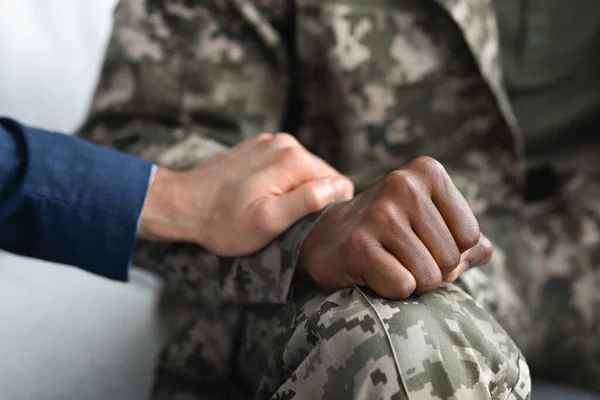Military operations need more than physical power and strategic planning. They necessitate a thorough comprehension of the human mind. Military psychology, a subfield that studies the psychological characteristics of military personnel, is critical to the accomplishment of military missions.
Military psychology is one of the most overlooked psychological counterparts. Undeniably, it plays a crucial role in the defence force by boosting the mental wellness of those who protect us and serve the nation. Military psychology is responsible for helping the army to function at its best. However, it is not only essential for the armed forces but also for the society they protect.
This blog discusses the significance of military psychology, emphasizing its contributions to improving performance, creating resilience, and, ultimately, assuring mission success.
Meaning of Military Psychology
In the military, a defence psychologist plays a crucial role in screening the mental and physical fitness of a recruit towards service and training. It helps in devising more effective training techniques. A critical component of such testing is identifying the best teaching officers or other leaders. Many specialists agree that this is an art as well as a science.
A considerable amount of study on military psychology has focused on group cohesion, the intangible but significant feeling of support, solidarity, and pride shared by military unit members. Cohesive units perform better overall, and their members are considerably less likely to suffer from post-traumatic stress disorder.
Optimizing Performance
Success in the military frequently depends on personnel’s capacity to perform at their peak under stress. Military psychologists seek to improve troops’ cognitive and emotional performance. This entails honing abilities such as decision-making, problem-solving, and data processing. A military psychologist contributes to the development of training programmes that imitate realistic combat circumstances, preparing soldiers to adapt effectively in the face of hardship.
Furthermore, psychological examinations help to determine individuals’ strengths and limitations, allowing for individualized training approaches. The idea is to build a force that is not just physically strong but also mentally bright and resilient.
Building Resilience
In extreme situations, like wartime, military personnel are subjected to extreme situations such as stress and, ultimately, anxiety, which, on some occasions, leads to post-traumatic stress disorder (PTSD). Resilience building is an essential part of military psychology, which helps people deal with the stress that comes with their job.
A military psychologist helps soldiers have skills that enable them to cope with stress and traumatic experiences through specialized interventions and training. These strategies include techniques that build mental toughness, regulate emotion, and develop an adaptive coping style. Apart from improving psychologically, this also promotes high levels of military unit effectiveness by decreasing the effects of stress on performance.
Enhancing Team Dynamics
Teamwork is the spine of any military action. Military psychologists study what holds groups together, their mode of communication, as well as appropriate leadership styles to be used for greater cohesiveness. A psychological understanding of what influences interpersonal relationships in a team helps build more coherent and effective units.
Additionally, military psychology is extremely essential in choosing and training the leaders for a mission. The army identifies the leaders with a great deal of decision-making ability, inspiring capacity, and strength in times of crisis and gives them the right psychological weaponry.
Adapting to Changing Environments
A military operation is dynamic; it mainly occurs in different environments, which cannot be predicted. Through military psychology, the best psychologist trains the personnel in the areas of flexibility and high-level thinking skills needed to accommodate changes. Training of soldiers involves thinking critically, making quick decisions, and adapting to new circumstances as they arise.
It is equally important to understand the psychology behind adaptability in today’s era of irregular threats and asymmetrical combat. Military psychologists develop adaptive training programs in order to train soldiers how to deal with uncertain military missions.
Mitigating Mental Health Challenges
Mental health problems such as depression, anxiety, and post-traumatic stress disorder (PTSD) are associated with the nature of military service. A defence psychologist recognises the need for mental wellness and strives to eliminate embarrassment related to seeking help while offering adequate mental healthcare for service members.
Mental health screenings, counselling services, and peer support programs ensure good health outcomes for servicemen. The military enhances the physical and psychological well-being of its personnel through proactive treatment of behavioural and mental disorders.
Finally, military psychology is an essential component of modern military operations. Military psychologists contribute to the optimization of performance, the development of resilience, the strengthening of team dynamics, and the adaptability to changing situations by digging into the intricacies of the human mind.
As the nature of combat evolves, the necessity of military psychology in guaranteeing the well-being and success of military troops becomes more apparent. Recognizing the psychological components of military service is a commitment to the mental health and resilience of those who serve and protect, not simply combat effectiveness.
Suppose you are seeking the best psychologist specializing in military psychology. In that case, Dr Dipti Yadav at Wellbeing Help can provide you with the necessary support and guidance to reclaim control of your life in the defence forces.
About Author
Dr Dipti Yadav is a professional psychologist, psychotherapist and counsellor providing expert guidance to individuals. She can help you reach your goals and solve various issues hampering your life quality. As the top counsellor, she can devise the best treatment and help you realize your life goals, deal with stress, manage anger, etc.


